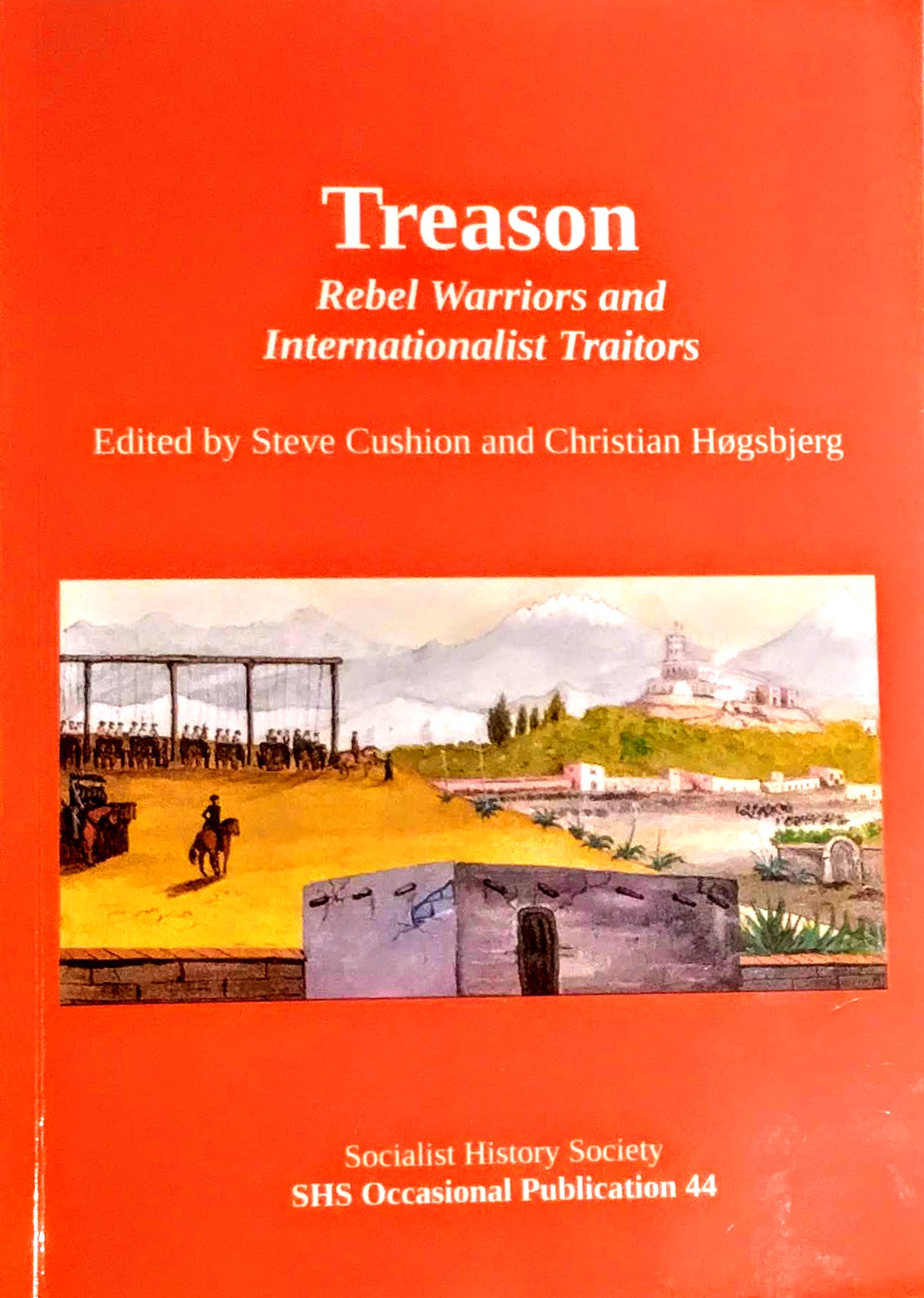Treason - Rebel warriors and international traitors
Steve Cushion and Christian Høgsbjerg (eds.), (London, Socialist History Society Occasional Publication no. 44, 2019, 94pp, paperback; £5.00)
Review by Brian Durrans
Dating from at least the thirteenth century, “treason” is a legal term referring to political or violent acts judged by representatives of the state (i.e. of the ruling class) seriously to subvert its integrity or stability. If caught, convicted traitors usually face execution or life imprisonment. Whether bribed, coerced or acting on principle, the traitor is feared or despised by those siding with the established order, but not always admired or celebrated by its opponents. In class terms, the moral compass ought to be clear, but in practice “treason” foregrounds individuals or groups who break, often with conspicuous heroism or cunning (or both), with the routine class-collaboration that maintains the status quo. But unless the stakes are already high in terms of national self-determination or class power, such acts alone rarely galvanise those whose interests they aim to serve.
Admiring heroes with the hindsight of history is one thing; siding with them at the time is another. Those who flush out and punish traitors exploit widespread and well-founded disapproval of deceit to undermine their reputations (calling a former home-team player a “traitor” shows how unforgiving football fans can be if s/he now plays a game for visiting rivals); and although an enemy of my state may be a loyal servant of yours, such loyalty only confirms that if an enemy at the gate is bad enough, one in the living room is far worse. Such acts of treachery, however sincere and justified in their own terms, and however inspiring for others in their own day or down the decades, do not in themselves make the case for replacing the existing order nor do they usually encourage engagement in that task which, even if it is unsuccessful, may help people appreciate what success requires.
This book, the fruit of a workshop convened in 2018 by the London Socialist Historians Group, focuses on “internationalist renegades and traitors”, all of them Europeans, from the early nineteenth century to the 1960s. In their Introduction, the editors deny such episodes constitute a “tradition” but still claim they offer “timely lessons in intransigent internationalism”. If by “timely” is meant that in the world’s current turmoil global justice, including the prevention of war and environmental disaster, demands internationalism more urgently than ever, then it makes sense; but less clear is why our internationalism needs to be “intransigent” rather than effective.
The book’s nine examples of people or groups acting “disloyally” on their convictions make inspiring reading, and it is always worth a reminder that solidarity overcomes divisions such as those of class and nation to further the interests of exploited and subject peoples. As these stories make clear, the course of such struggles is seldom predictable; activists often but not always learn the lessons of experience; and – perhaps most strikingly – in none of these examples is the struggle for liberation yet complete: not in the Caribbean where Polish soldiers sided with Haitian revolutionaries; nor in Mexico whose nationalists were strengthened by an Irish battalion; nor in Ireland itself whose independence cause also inspired British volunteers; nor in Germany where some workers and soldiers defied the Nazis and sided with the USSR or, in France, joined the Resistance; nor in Ethiopia where a handful of Italian Communists helped locals resist the fascist occupation; nor in Indochina or Algeria whose armed resistance attracted a few recruits from the colonial side.
EFFECTIVE INTERNATIONALISM
What can be done, in the present, with the information provided in this book? In their Introduction the editors trace a thin historical line (not, remember, a “tradition”) of examples of “treasonable” behaviour from the English Civil War, via the focus of each chapter and including the International Brigades in Republican Spain and the struggle against South African Apartheid and (very briefly) up to the current struggle for Palestine. At the end of their Introduction they rightly point to the persistent class-divided and increasingly militarised world of nation-states and global (dis)order and suggest that the heroic (and hitherto largely unsung) individuals who feature in the book deserve recognition for their sacrifices. There’s a strong case for that, but a stronger one for asking the harder question of what kind of activity is best suited to present challenges.
Even in the examples mentioned in the book itself, not all “treasonable” work involved taking up arms, and even where this was important it was by no means the only means of struggle. In the case of defeating apartheid, military assistance from the Socialist countries was certainly decisive (most conspicuously, as Mandela acknowledged, from Cuba at Cuito Cuanavale), but the editors’ passing reference (p. 16) to “British radical students” helping smuggle arms to the ANC’s armed wing inside South Africa hardly deserves mention by comparison not only with what the Cubans did but also with what even rather unradical students (and others) did to help bring down the regime by closing or refusing to open accounts with Barclays Bank until it withdrew from the apartheid state.
Was that “intransigent” internationalism? Maybe. But as an example of effective internationalism, that boycott can better inform current and future strategies (such as BDS – the Palestinian-led Boycott, Divestment and Sanctions campaign) than apparently more heroic or “treasonable” acts. In any case, attempts by opponents of Palestinian rights to outlaw BDS are beginning to make campaigners seem heroic simply for being effective internationalists.







